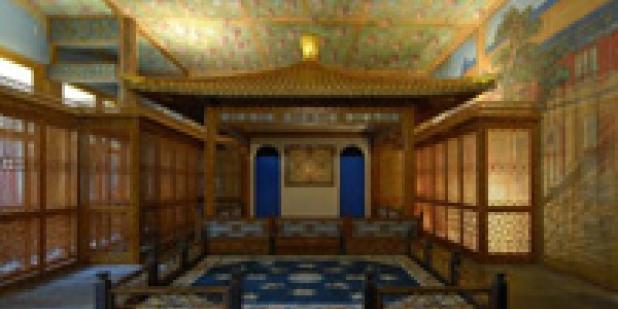Join us for a free one-day workshop for educators at the Japanese American National Museum, hosted by the USC U.S.-China Institute and the National Consortium for Teaching about Asia. This workshop will include a guided tour of the beloved exhibition Common Ground: The Heart of Community, slated to close permanently in January 2025. Following the tour, learn strategies for engaging students in the primary source artifacts, images, and documents found in JANM’s vast collection and discover classroom-ready resources to support teaching and learning about the Japanese American experience.
The Emperor's Private Paradise: Treasures from the Forbidden City
Never before seen by the public, the contents of an Emperor's private retreat deep within the Forbidden City will be revealed for the first time at the Peabody Essex Museum in Salem, MA.
Where

Never before seen by the public, the contents of an Emperor’s private retreat deep within the Forbidden City will be revealed for the first time at the Peabody Essex Museum.
An 18th-century compound in a hidden quadrant of the immense imperial complex, the Qianlong Garden (also known as the Tranquility and Longevity Palace Garden), is part of a decade-long, multimillion-dollar conservation initiative undertaken by the World Monuments Fund in partnership with the Palace Museum, Beijing.
Ninety objects of ceremony and leisure — murals, paintings, wall coverings, furniture, architectural elements, jades and cloisonné — unveil the private realm of the Qianlong Emperor (r.1736-1796), one of history’s most influential figures. In his time, he was among the richest, most powerful men in the world. A connoisseur, scholar and devout Buddhist, he created a luxurious garden compound to serve throughout his retirement as a secluded place of contemplation, repose and entertainment.
Organized by PEM in partnership with the Palace Museum, Beijing, and in cooperation with World Monuments Fund. The exhibition travels to The Metropolitan Museum of Art, New York, and the Milwaukee Art Museum. The exhibition and national tour are made possible in part by generous support from the Mandarin Oriental Hotel Group and American Express. A major grant has been provided by the E. Rhodes and Leona B. Carpenter Foundation, and additional support has been provided by the National Endowment for the Arts, ECHO (Education through Cultural and Historical Organizations) and the East India Marine Associates of the Peabody Essex Museum.
Featured Articles
Please join us for the Grad Mixer! Hosted by USC Annenberg Office of International Affairs, Enjoy food, drink and conversation with fellow students across USC Annenberg. Graduate students from any field are welcome to join, so it is a great opportunity to meet fellow students with IR/foreign policy-related research topics and interests.
RSVP link: https://forms.gle/1zer188RE9dCS6Ho6
Events
Hosted by USC Annenberg Office of International Affairs, enjoy food, drink and conversation with fellow international students.
Join us for an in-person conversation on Thursday, November 7th at 4pm with author David M. Lampton as he discusses his new book, Living U.S.-China Relations: From Cold War to Cold War. The book examines the history of U.S.-China relations across eight U.S. presidential administrations.




